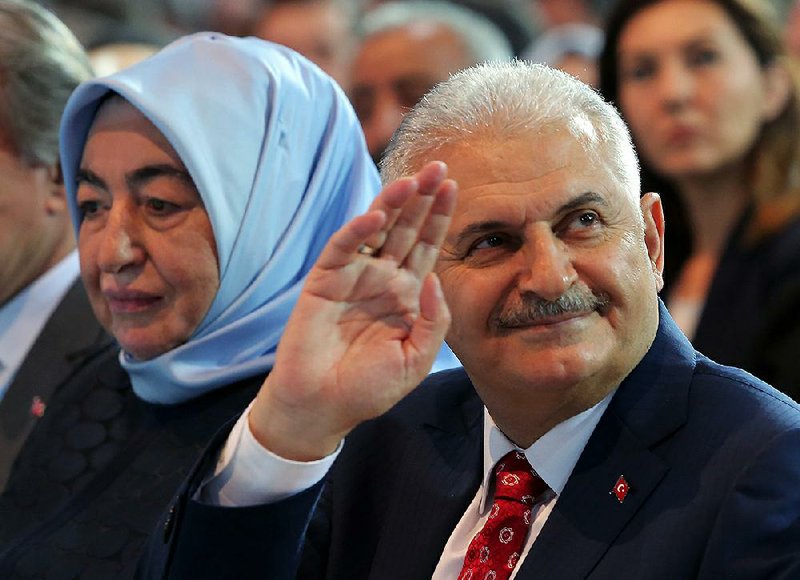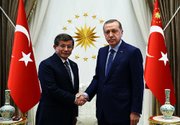ISTANBUL -- Turkey's governing Justice and Development Party on Sunday unanimously elected a longtime ally of President Recep Tayyip Erdogan to become prime minister, paving the way for a constitutional overhaul that would extend the president's powers.
Binali Yildirim, who ran as the sole candidate for prime minister, received support from all 1,405 delegates at a party congress. Later Sunday, Erdogan gave Yildirim, 60, the official mandate to form a government.
The previous prime minister, Ahmet Davutoglu, abruptly stepped down May 5 after a public rift with Erdogan.
The change in party leadership comes at a time when NATO member Turkey is facing an array of security threats, including renewed conflict with Kurdish rebels in the southeast, a wave of suicide bombings linked to Kurdish and Islamic State militants, and growing blowback from the war in neighboring Syria.
The transition also coincides with growing tensions with the European Union over a deal to reduce the flow of illegal migrants from Turkey to Greece. Davutoglu helped broker that deal.
Davutoglu, a onetime adviser to Erdogan and a former foreign minister, had a falling out with the president over several issues, including the possibility of peace talks with Kurdish rebels, and the pretrial detention of journalists accused of spying and academics accused of supporting terrorism.
Erdogan has pushed for a broader definition of terrorism, alarming rights groups who say existing laws are already too widely interpreted and used to crush dissent. His stance is also at odds with EU conditions for Turkish citizens to benefit from visa-free travel.
In a speech to thank delegates who voted to endorse him, Yildirim said Turkey would press ahead with operations against Kurdish rebels until the group's armed campaign comes to an end, and he called on the EU to end "the confusion" over Turkey's membership bid and the migration deal.
"It is time we know what they think about Turkey," Yildirim said. "Whether Turkey becomes a member or not, it will continue to expand its democracy and development with determination."
Yildirim is expected to play a subservient role to the president and push forward a series of constitutional amendments that would allow Erdogan to establish an all-powerful presidential system. As the constitution now stands, Erdogan has some powers under the current Turkish Constitution, but the post of president is largely ceremonial.
"We have always proudly said that we are Recep Tayyip Erdogan's companion, that we share a common fate and common passion," Yildirim said in his speech. "Mr. President, we promise that your passion will be our passion, your cause will be our cause, your path will be our path."
By law, Erdogan is supposed to be above party politics, so he did not attend the convention. Even so, he made himself felt there, with a message that was read at the opening of the ceremony. In the message, he called for a new constitution and a new system of government. Members of the party stood up as his message was read.
"My legal bond with the [Justice and Development Party] may have ended the day I took the presidential oath of office, but my bonds of love have never ended and never will," he said in the statement.
Last week, the majority Justice and Development Party parliament voted on legislation that would strip more than 100 lawmakers -- most of them from the People's Democratic Party -- of parliamentary immunity, leaving them open to prosecution for crimes such as supporting terrorism.
People's Democratic Party Chairman Selahattin Demirtas called the bill "a political coup" and an attempt to "completely destroy the separation of powers" between government institutions in Turkey.
"We need harmony between the presidency and the government," Yasin Aktay, a Justice and Development Party lawmaker from Siirt province, said Sunday on CNN Turk.
"We are a party of a big cause," Foreign Minister Mevlut Cavusoglu told Turkish broadcaster NTV from the convention. "Erdogan is the leader of this cause."
Justice and Development Party leaders have blamed Turkey's turmoil on a chaotic political system that they say will be tempered by a strong presidency and more pliant premier. Erdogan loyalists viewed Davutoglu as too independent.
When Davutoglu negotiated a deal with European leaders to help ease the migrant crisis -- including more than $6 billion in aid and potential visa-free travel for Turks -- Erdogan publicly played down the achievement.
Worries abroad
The Turkish government has said it is fighting a "war on terror" against the Kurdistan Workers' Party, which is fighting for autonomy for Turkey's ethnic Kurds.
Erdogan has accused members of the pro-Kurdish People's Democratic Party of links to the Kurdistan Workers' Party. Both Turkey and the United States have designated it a terrorist organization.
Battles between Turkish security forces and Kurdish militants have left scores dead, particularly in the southeast.
Ahead of her visit to Turkey, German Chancellor Angela Merkel said Sunday that "some developments in Turkey fill us with big worries."
The chancellor expressed concern over the Kurdish conflict in an interview with Frankfurter Allgemeine Sonntagszeitung, saying she wants "the Kurdish people [to] have an equal place and a good future in Turkey."
Merkel left for Turkey on Sunday afternoon to attend the first World Humanitarian Summit in Istanbul, and to meet with Erdogan.
Several high-ranking German lawmakers called on Merkel to be outspoken during her trip and express concern about what the speaker of Germany's Parliament, Norbert Lammert, has called Erdogan's "autocratic ambitions," including his push to strip legislators in Turkey of their immunity from prosecution.
Also before the summit, United Nations Deputy Secretary-General Jan Eliasson said the gathering was a "wake-up call for action."
"There is a huge need for us to show solidarity with those who are affected by natural disasters and man-made disasters," Eliasson said.
Natural disasters, he warned, are on the rise because of climate change, with more than 22 countries affected by the El Nino weather phenomenon.
Eliasson also urged leaders to "stand up" for international humanitarian law that is being flouted in Afghanistan, Syria and Yemen.
He described sieges against civilians in Yemen and Syria as "an absolute violation of international law" and "practically a medieval practice."
He also expressed hope that more energy would be devoted to conflict prevention as an outcome of the two-day Istanbul meeting.
Other priorities on the summit's "agenda for humanity" action include closing funding shortfalls and reducing the number of people in need.
Sixty-five heads of state and government representatives from 180 countries are expected to attend. Sixty-eight countries including host Turkey, Germany and the U.S. issued a joint statement ahead the summit saying they were on board with its goals.
Information for this article was contributed by Ceylan Yeginsu of The New York Times; by Suzan Fraser and staff members of The Associated Press; and by Erin Cunningham of The Washington Post.
A Section on 05/23/2016

